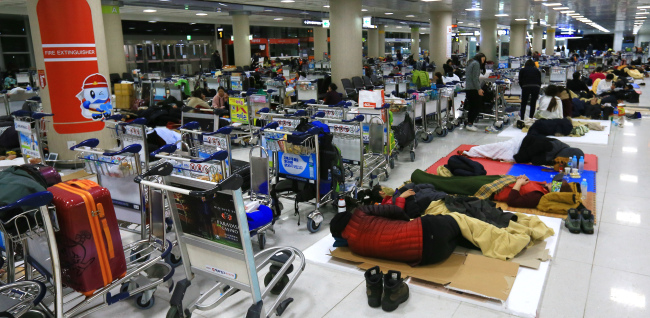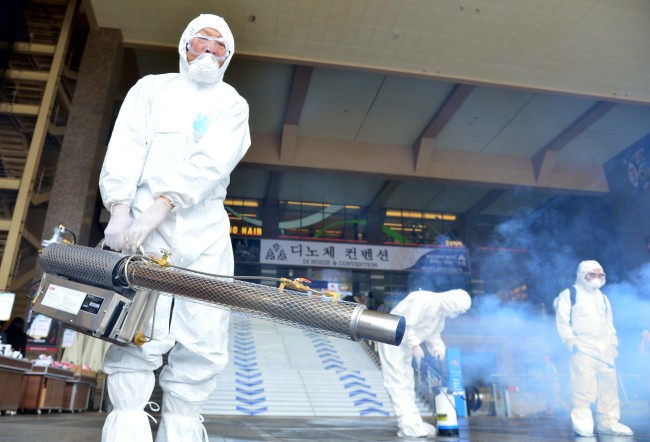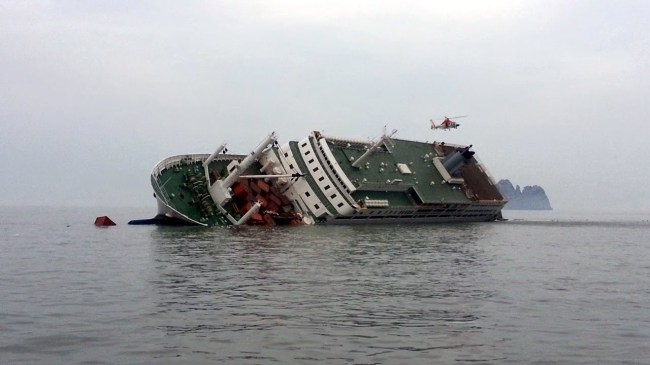In April 16, 2014, ferry Sewol plunged to the bottom of the sea, leaving 304 dead or missing. The nation’s spirit shattered and authorities were humiliated in their search for answers on why they were unable to save most of the passengers while the ship sank slowly for hours.
The disaster revealed glaring problems in the Korean government’s risk and crisis management capabilities. There is the late response of the authorities, the blame games played by officials in the aftermath of the disaster and also the lack of clear instructions in such situations.
One of the worst maritime disasters in the country’s history left Koreans questioning: Is Korea safe? Can our government protect us if disaster strikes?
Last month, record snow left thousands of passengers stranded at Jeju International Airport for nearly three days as flights were grounded. It was later revealed that the emergency manual of the state-run Korea Airports Corporation lacked specific instructions on how to address the problem of passengers stuck in the airport.
 |
| Travelers wait for flights to resume at Jeju Airport in January (Yonhap) |
Lee Jae-eun, a professor of Chungbuk National University and former president of the Korea Association for Crisis, pointed out the failure of the authorities to assess the severity or magnitude of the situation.
“Having the passengers lay boxes and sleep on the floor is not a well-organized disaster management. The reactions (by the authorities) were spontaneous and inefficient,” he said.
The situation did little for confidence in the Korean government. It already drew flak from the public after its questionable response to the Middle East respiratory syndrome last year made the country the stage for the second biggest MERS outbreak in the world, right behind the disease’s epicenter Saudi Arabia.
Lee said that majority of Korea’s crisis management still relies on kneejerk reactions, rather than professionalism and well-established systems. He pointed out that officials cook up individual response plans whenever something crops up, whether it is the MERS outbreak, the Sewol disaster or preventing mosquito-borne Zika virus from entering the country.
 |
| Quarantine authorities disinfect a building in Seoul during the MERS outbreak in summer 2015. (The Korea Herald) |
The government has made efforts to organize government reactions in disaster situations.
In the aftermath of the Sewol tragedy, the government disbanded the Coast Guard and created the Ministry of Public Safety and Security to act as a control tower in crisis. But the efficiency of the new system was questioned in light of last year’s MERS outbreak.
Lee Chung-min, a professor of international relations at Yonsei University, wrote in his column that the Korean government has structural limits in having different organizations work together in times of crisis. He cited the reasons for this as the authoritative top-down system of organizations, non-linear communication and secrecy between different groups.
Lee of CNU said that the Korean government lacks what he calls a “core system” of risk management, a system which allows the institution to materialize the values, expertise, leadership and devotion that comes from understanding that it is for the people.
“The ‘control tower’ (of the Security Ministry) was ineffective because it lacked authority and responsibility and also lacked leadership that can accurately assess the situation and take charge. In addition to coming short on expertise, officials were not sufficiently devoted, out of fear that they will shoulder all the blame in case something goes wrong.” Lee said.
 |
| A rescue helicopter flies over the passenger ship Sewol while it sinks with 477 people on board, in waters off South Korea’s southwestern coast on April 16, 2014. (Yonhap) |
He explained that the concept of security and risk management has changed to encompass not only military security and regional dispute, but elements of economics, environment, natural disasters as well as other factors such as cyber-attacks and meltdown of nuclear facilities.
He suggested that the country’s risk management should be made into an academic discipline that does research to assess and anticipate risks and disasters that lie around the corner.
“The paradigm of risk management has changed. Responding to each disaster as it comes along will no longer suffice,” he said.
By Yoon Min-sik (minsikyoon@heraldcorp.com)

